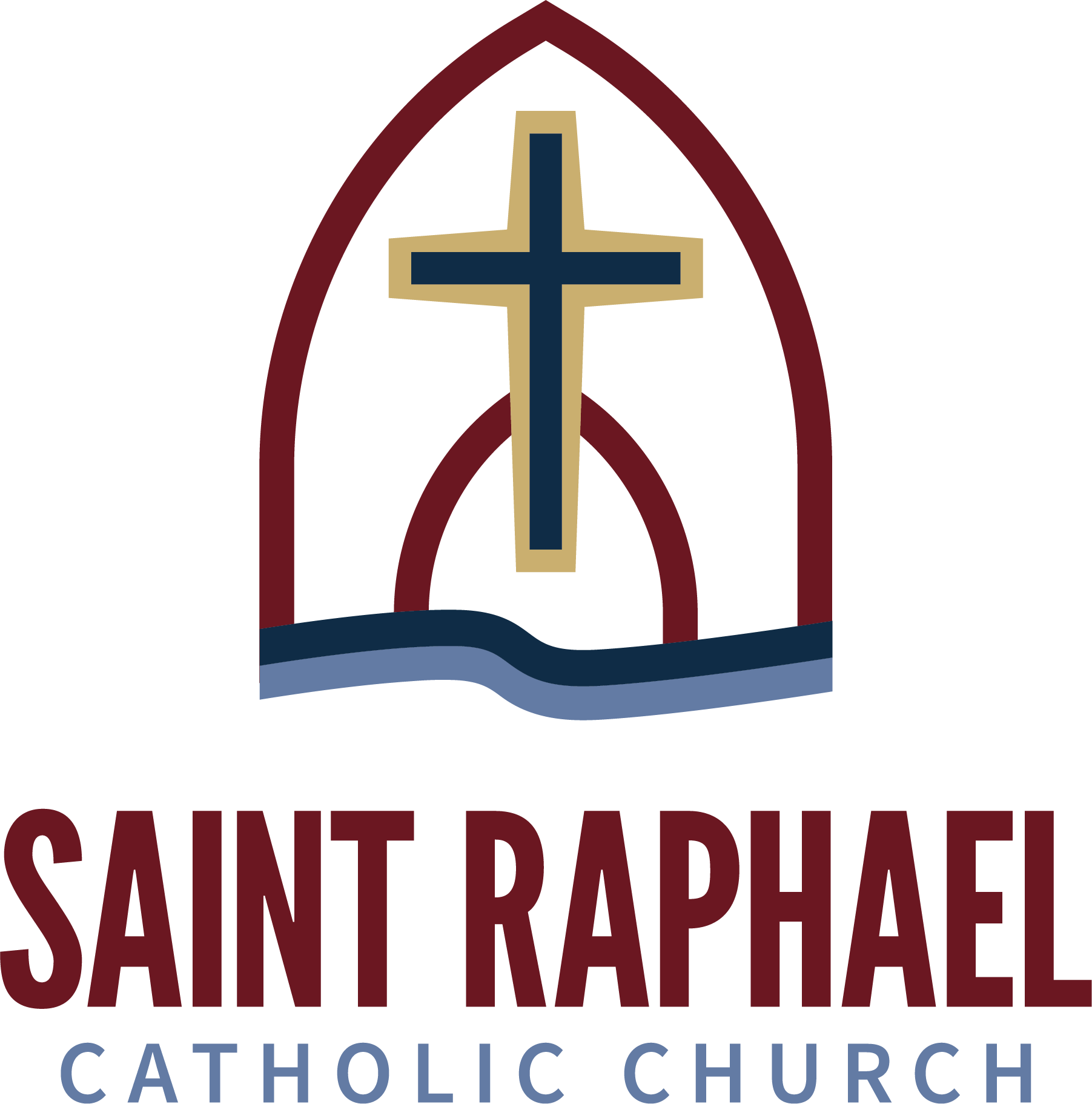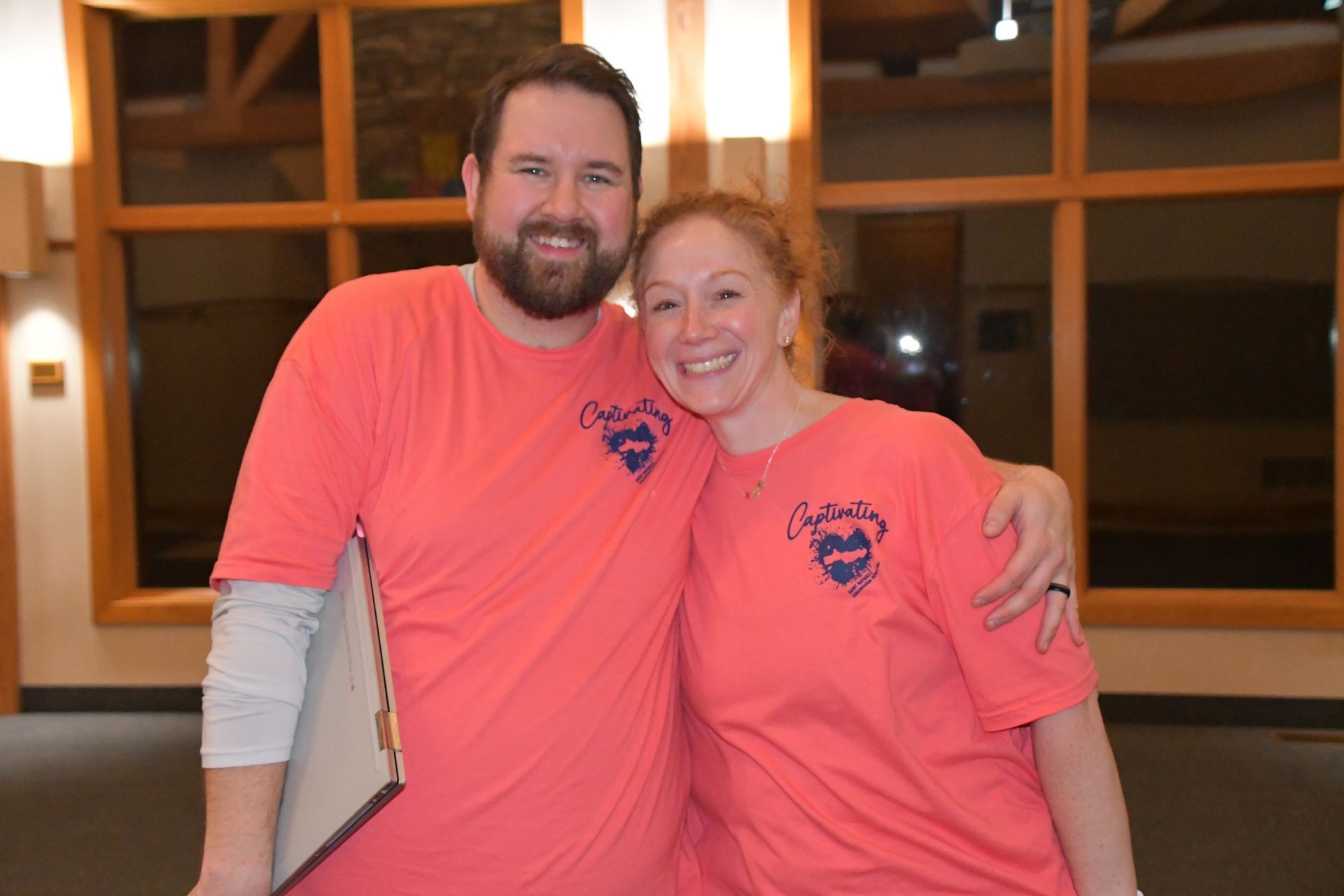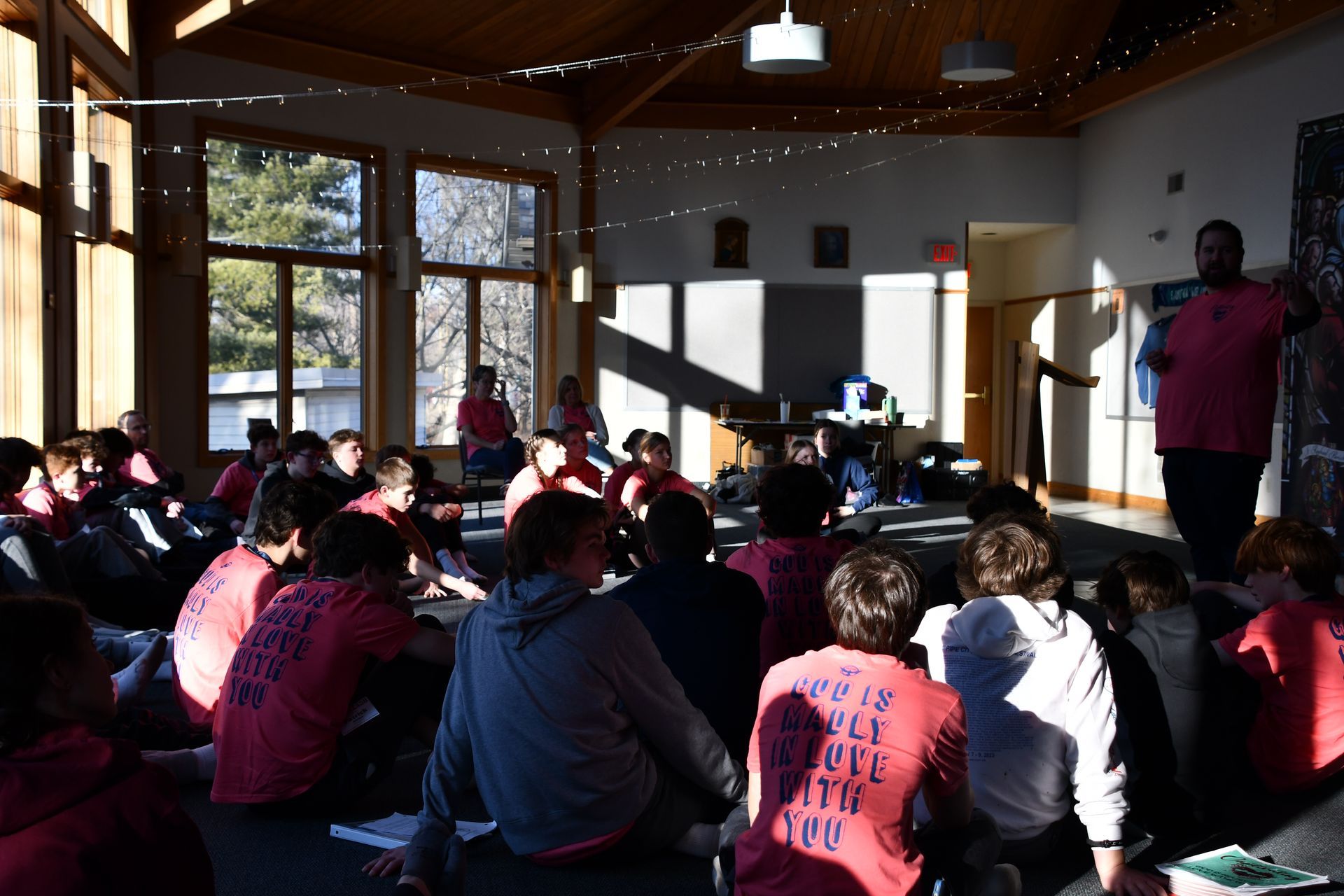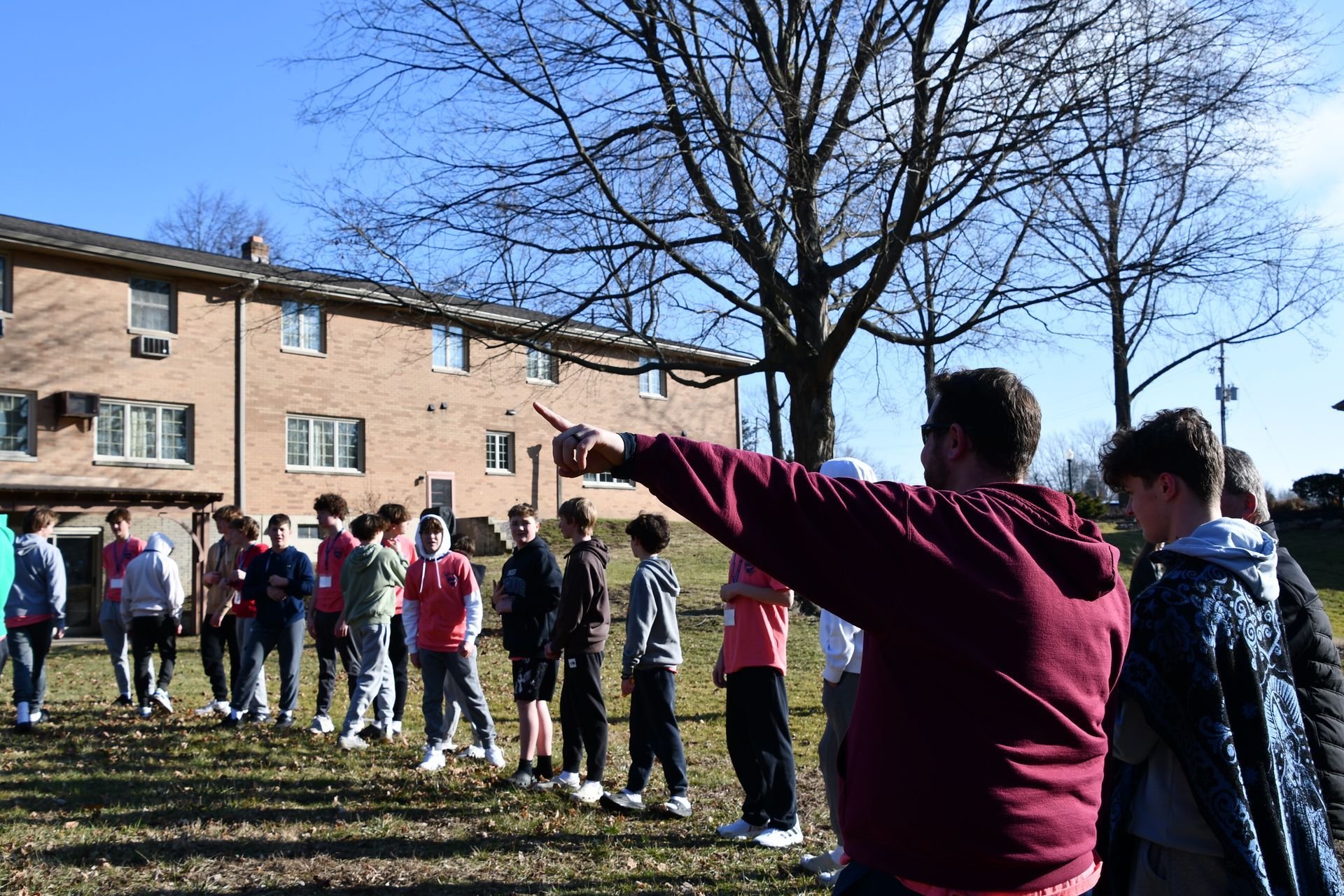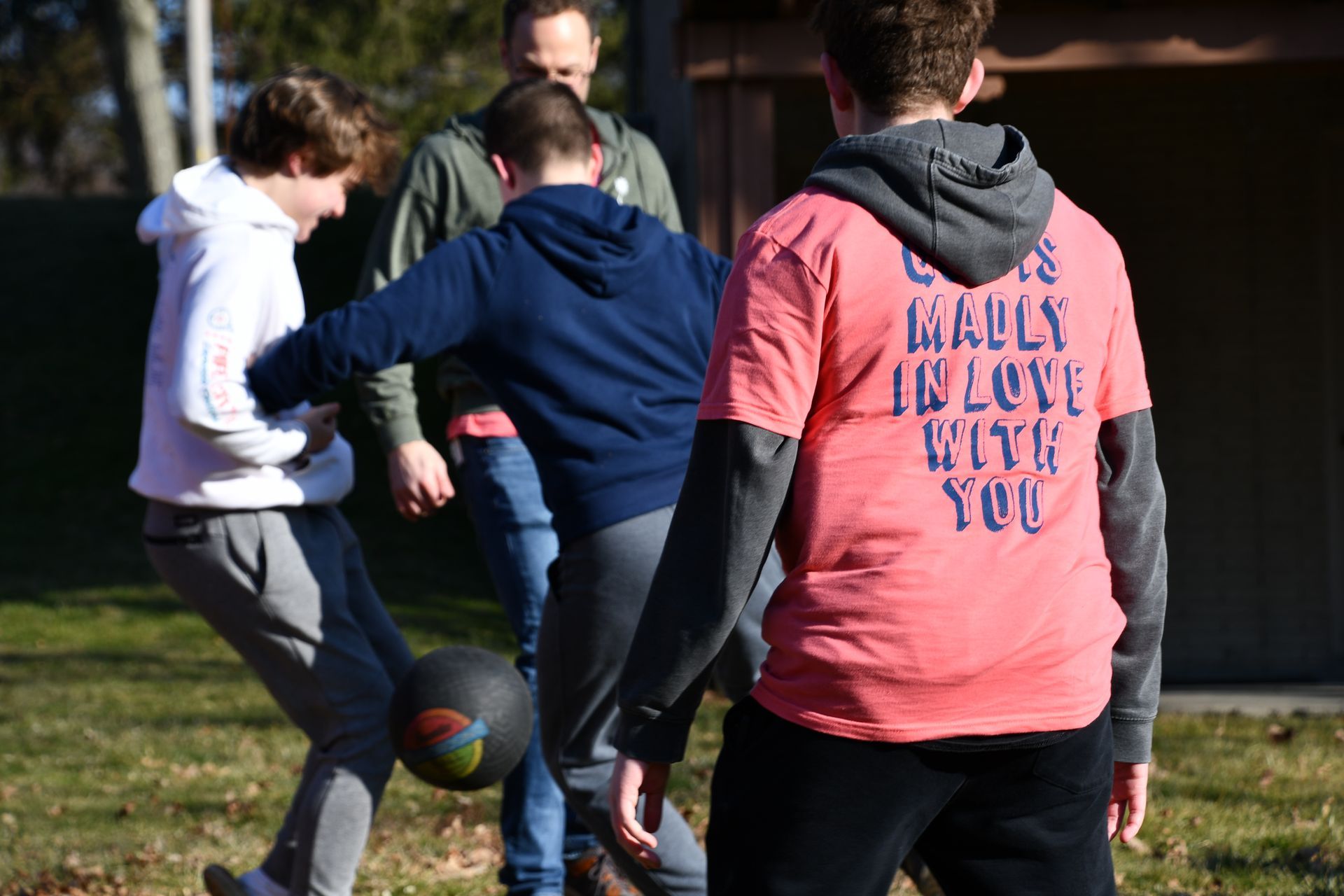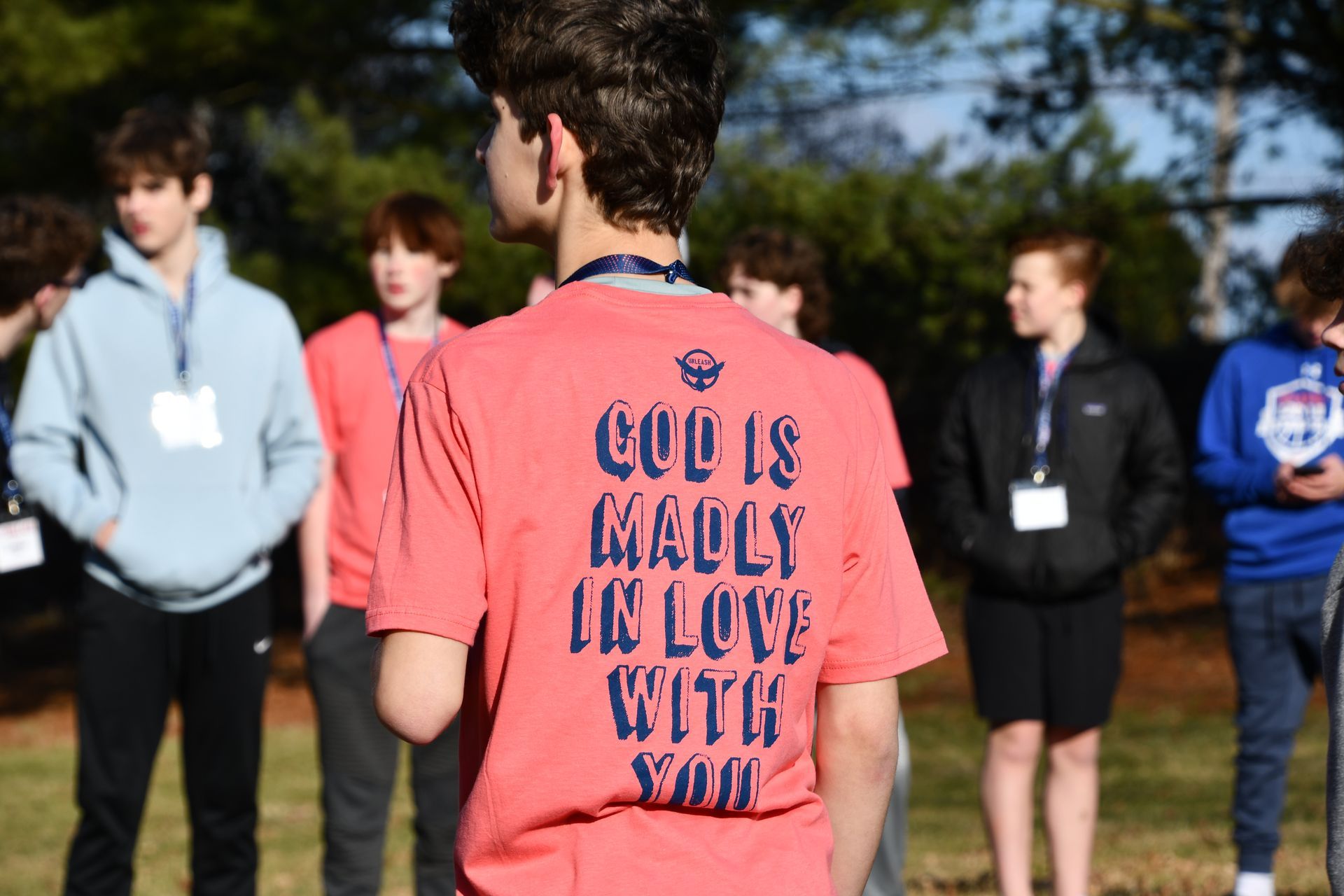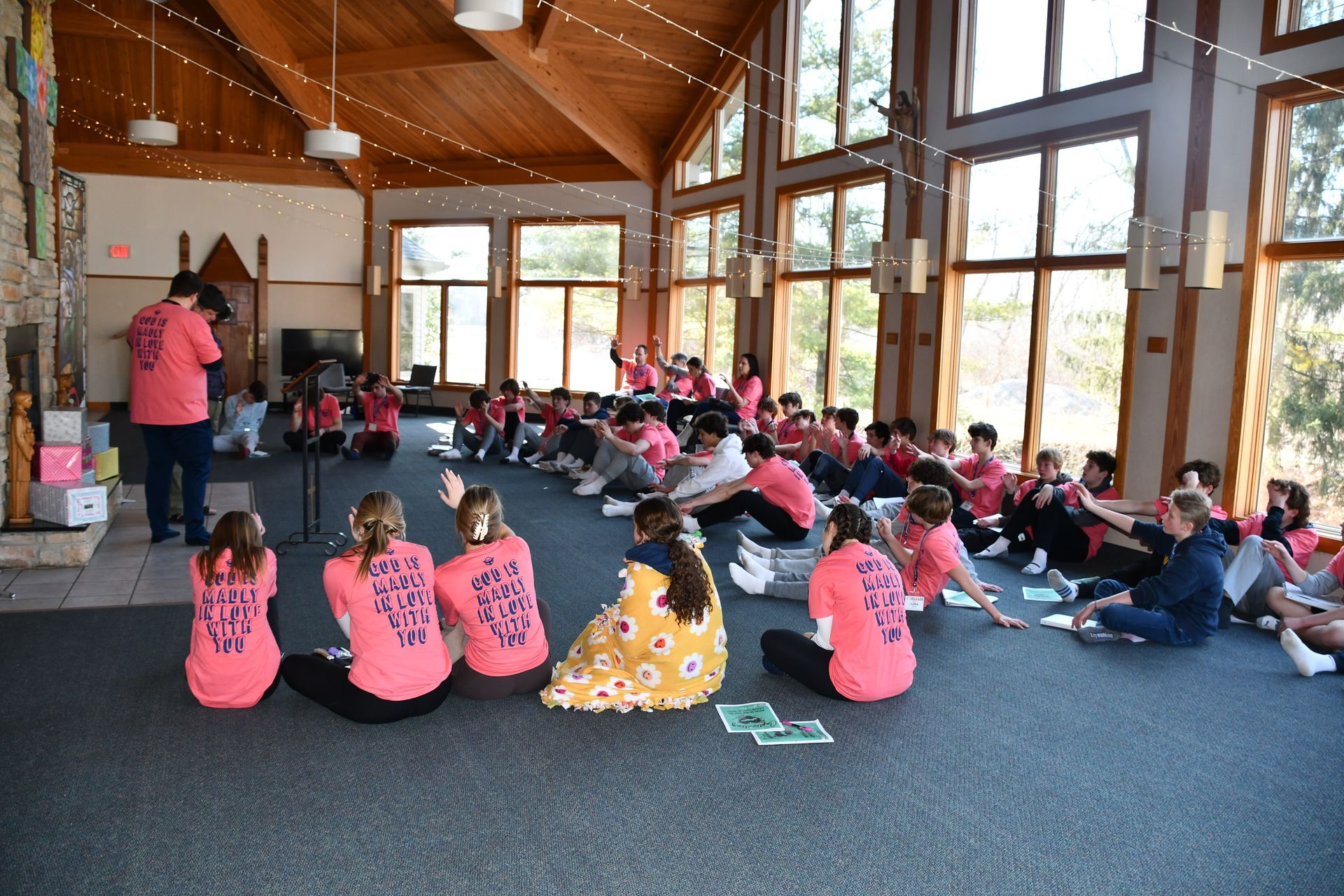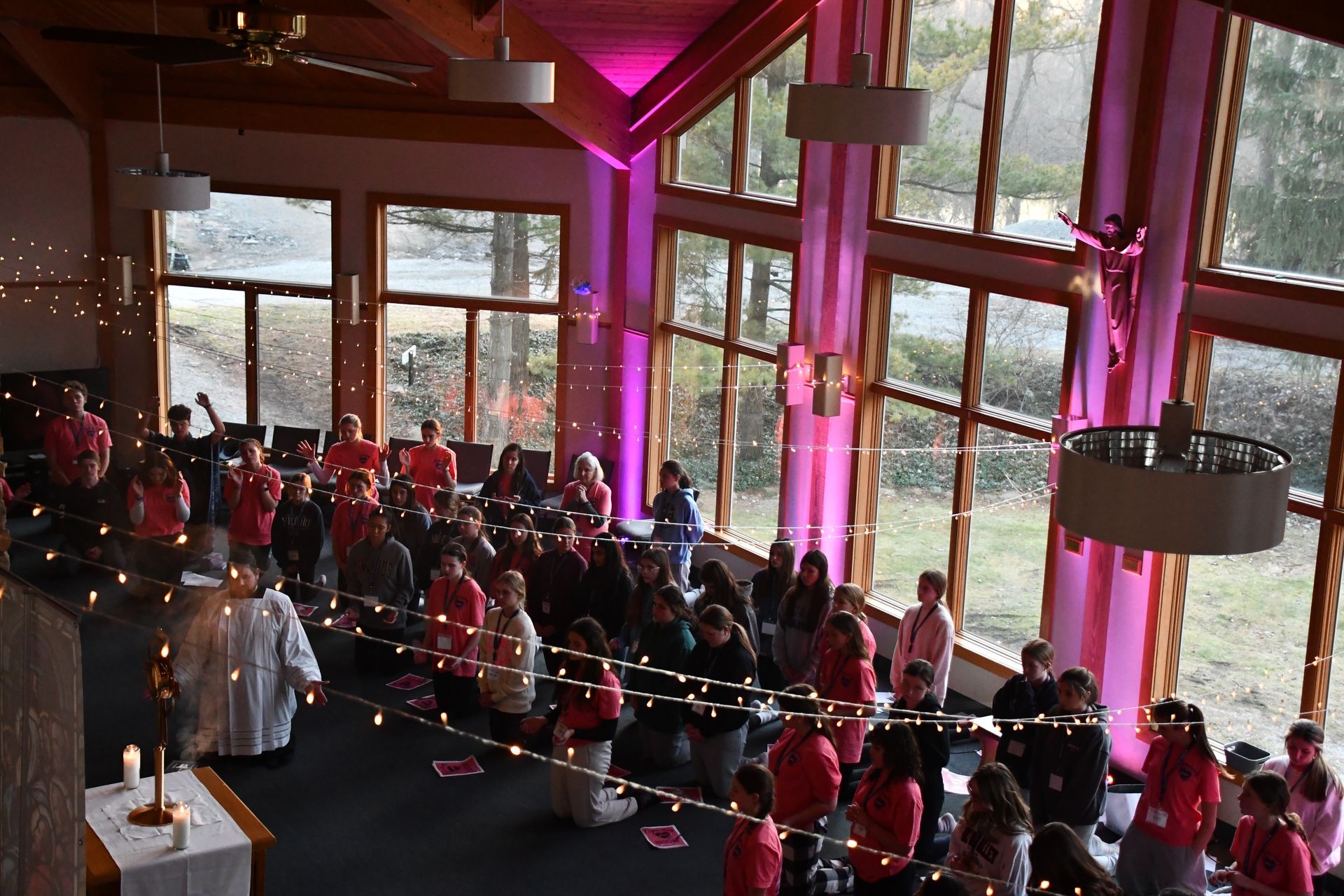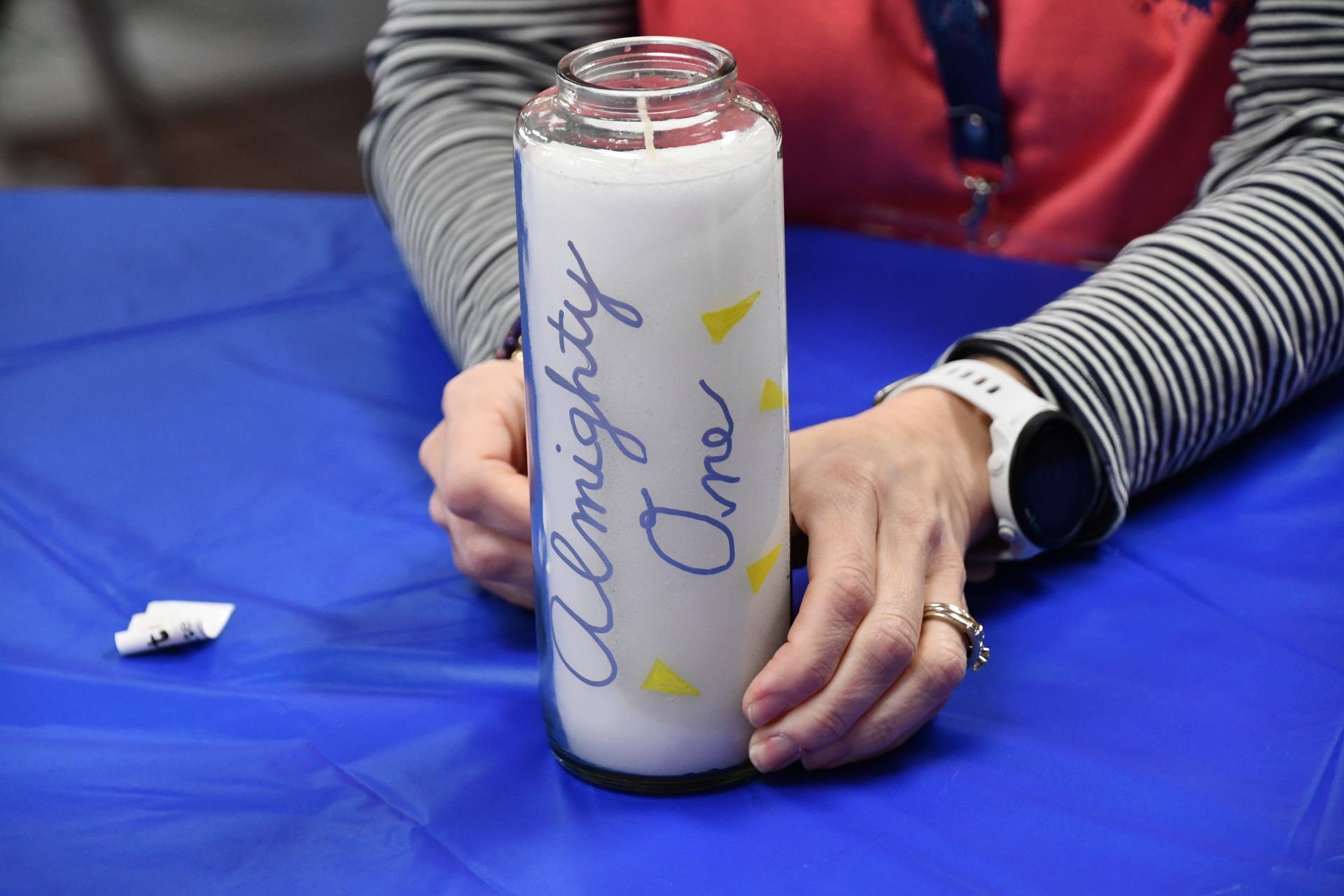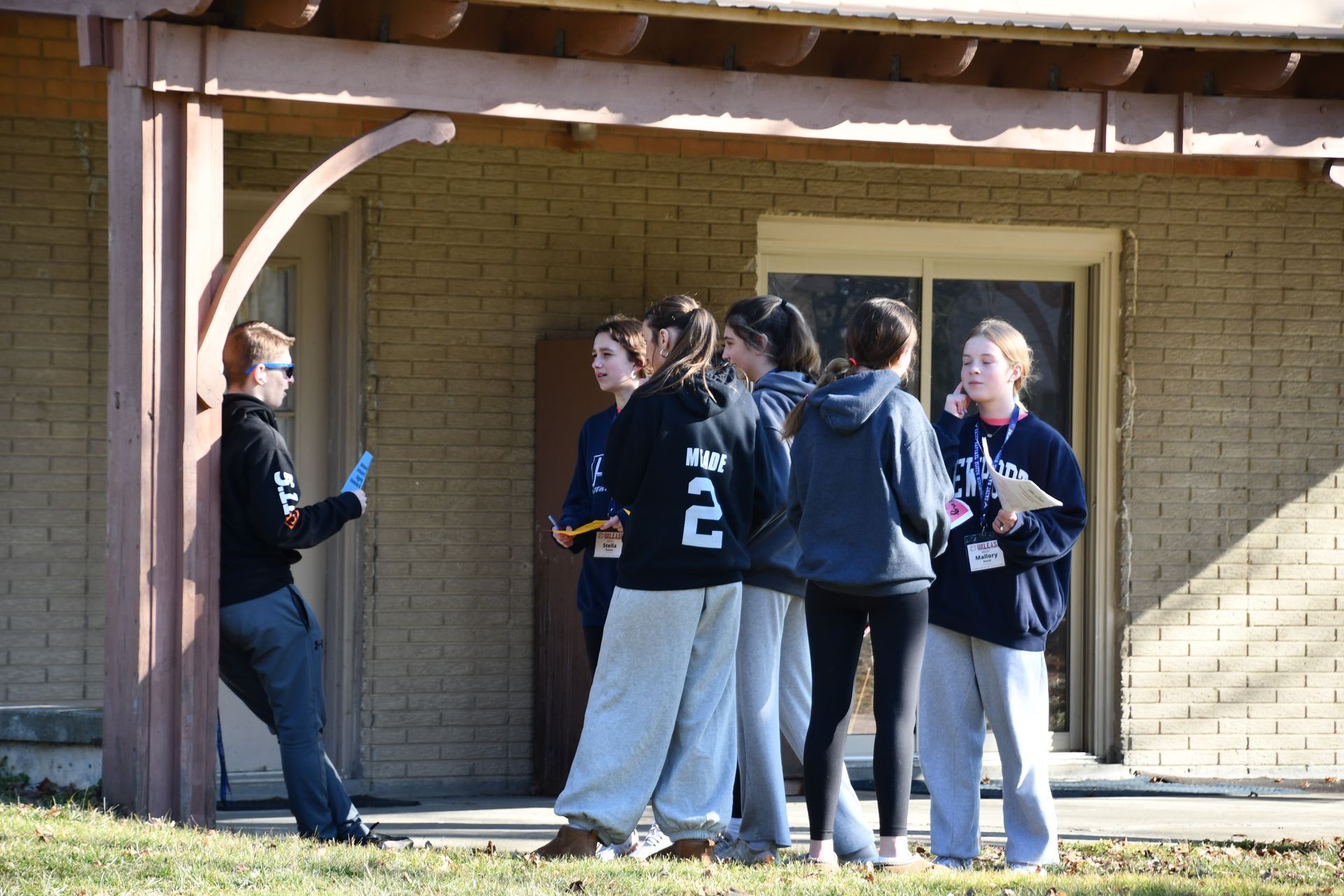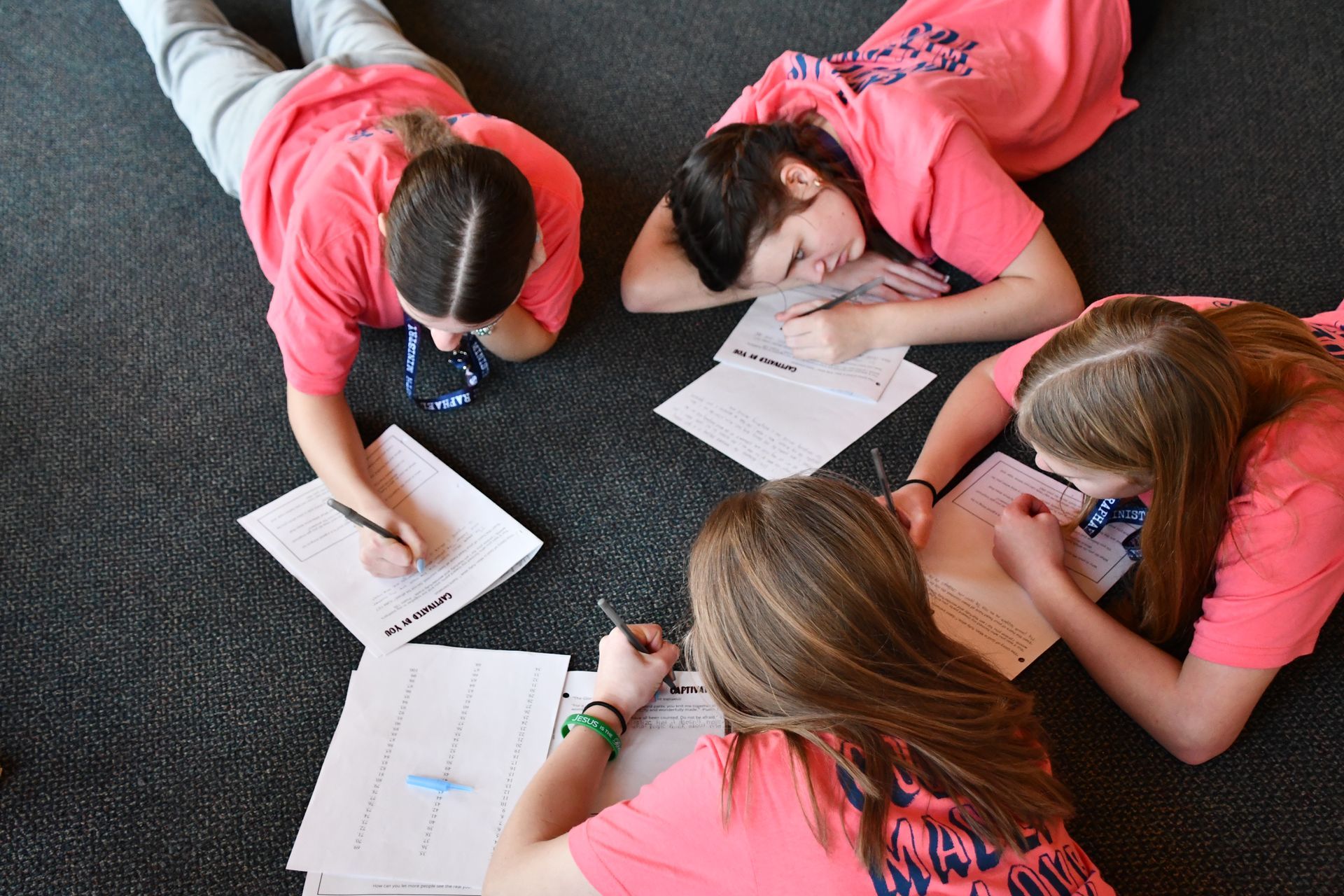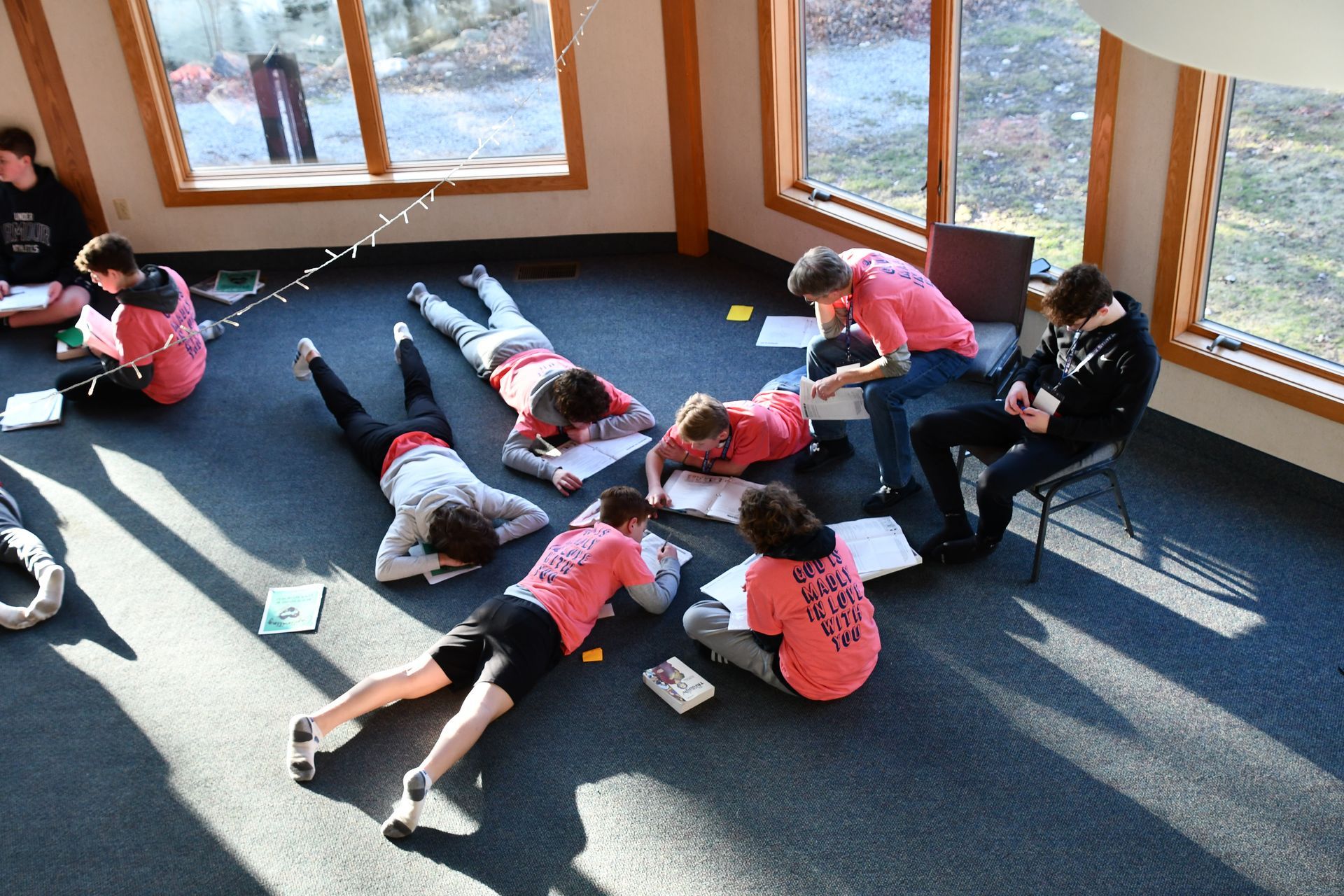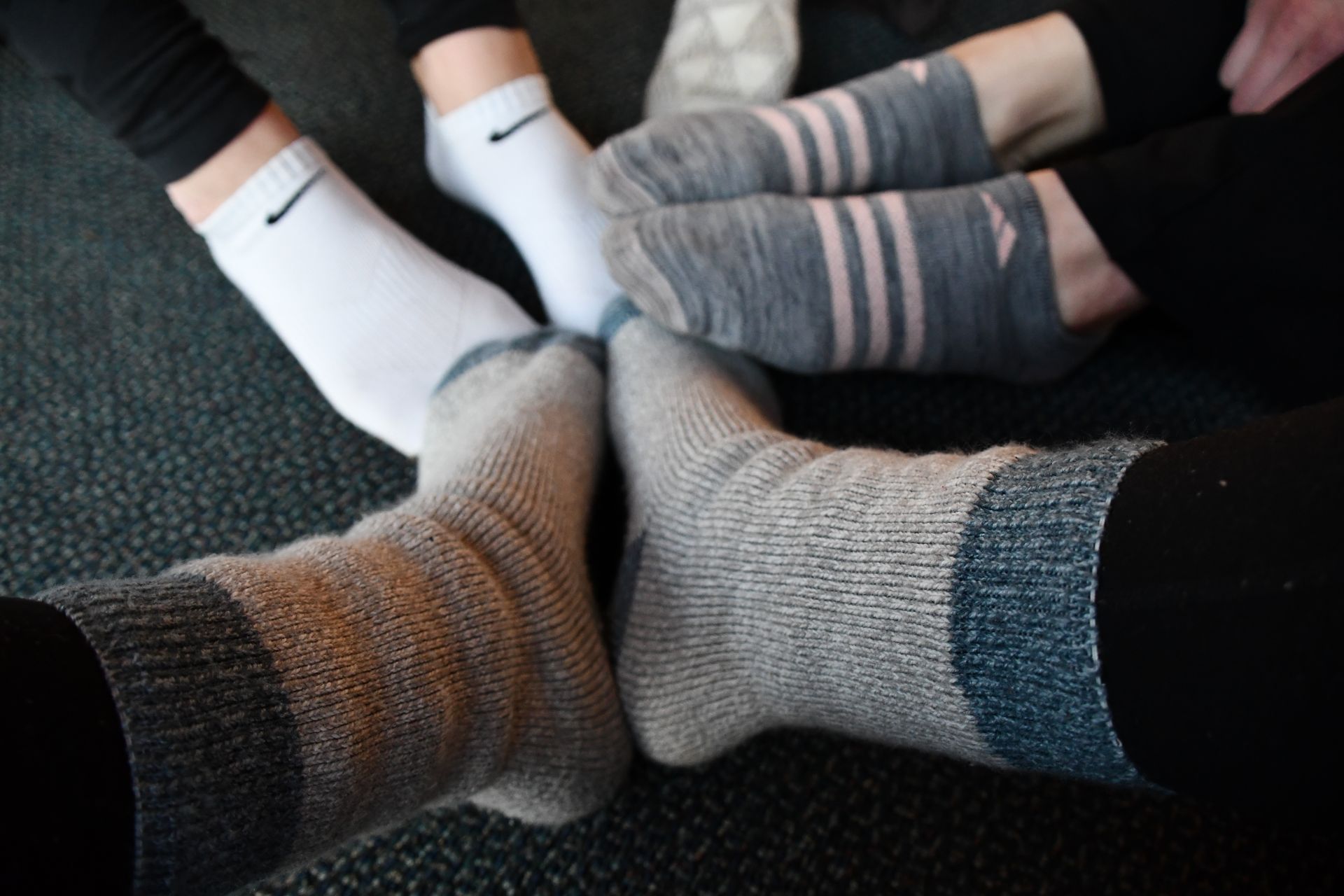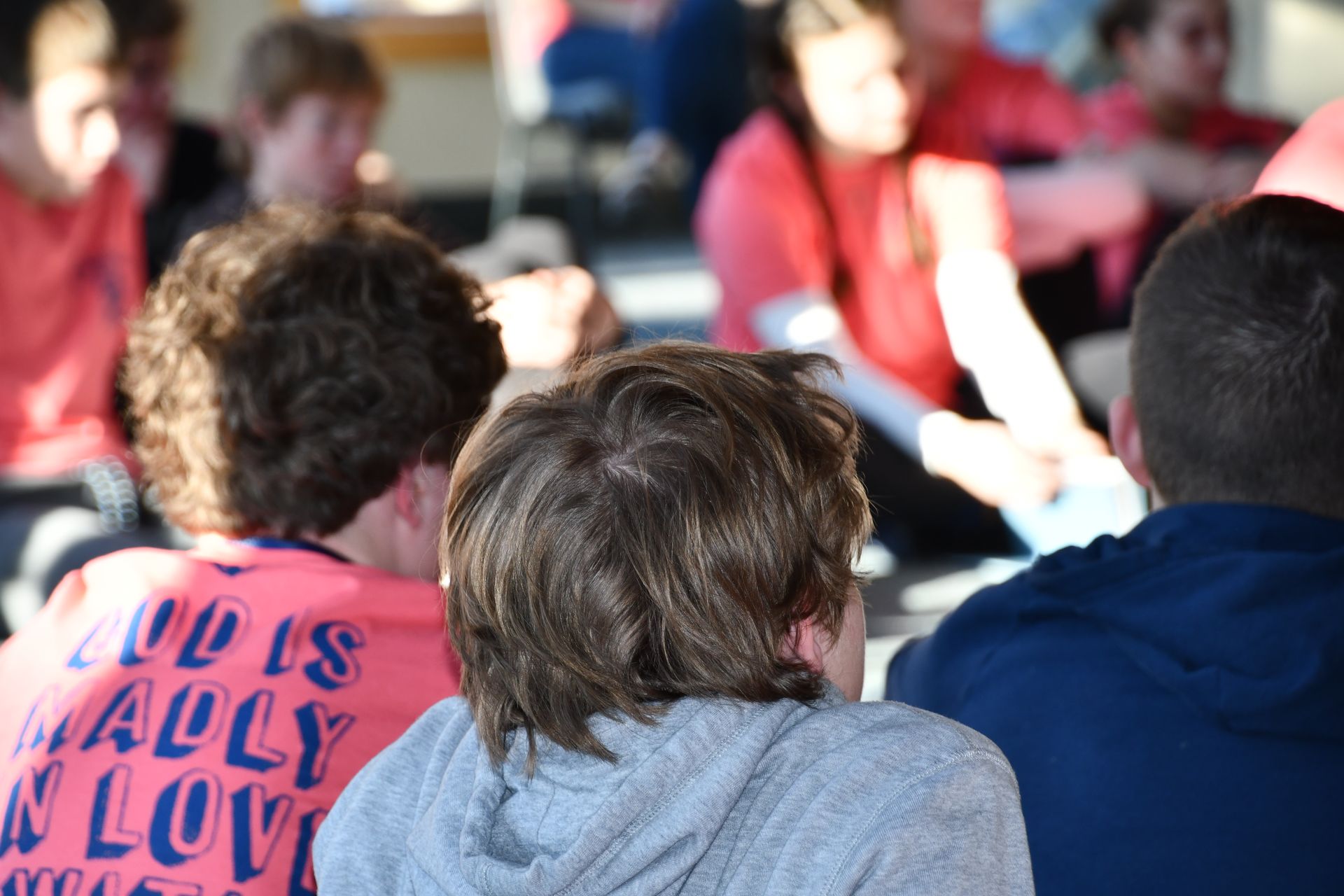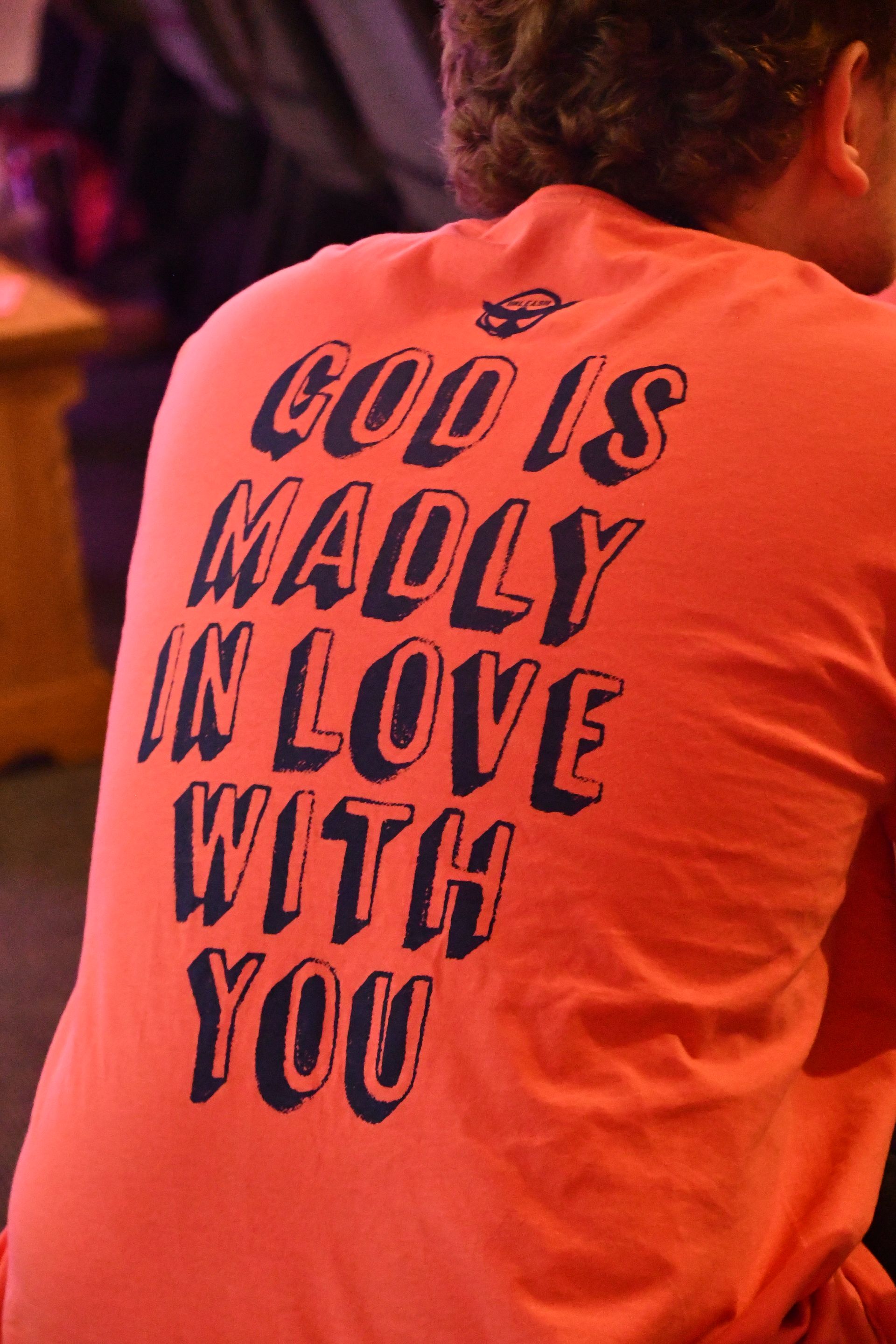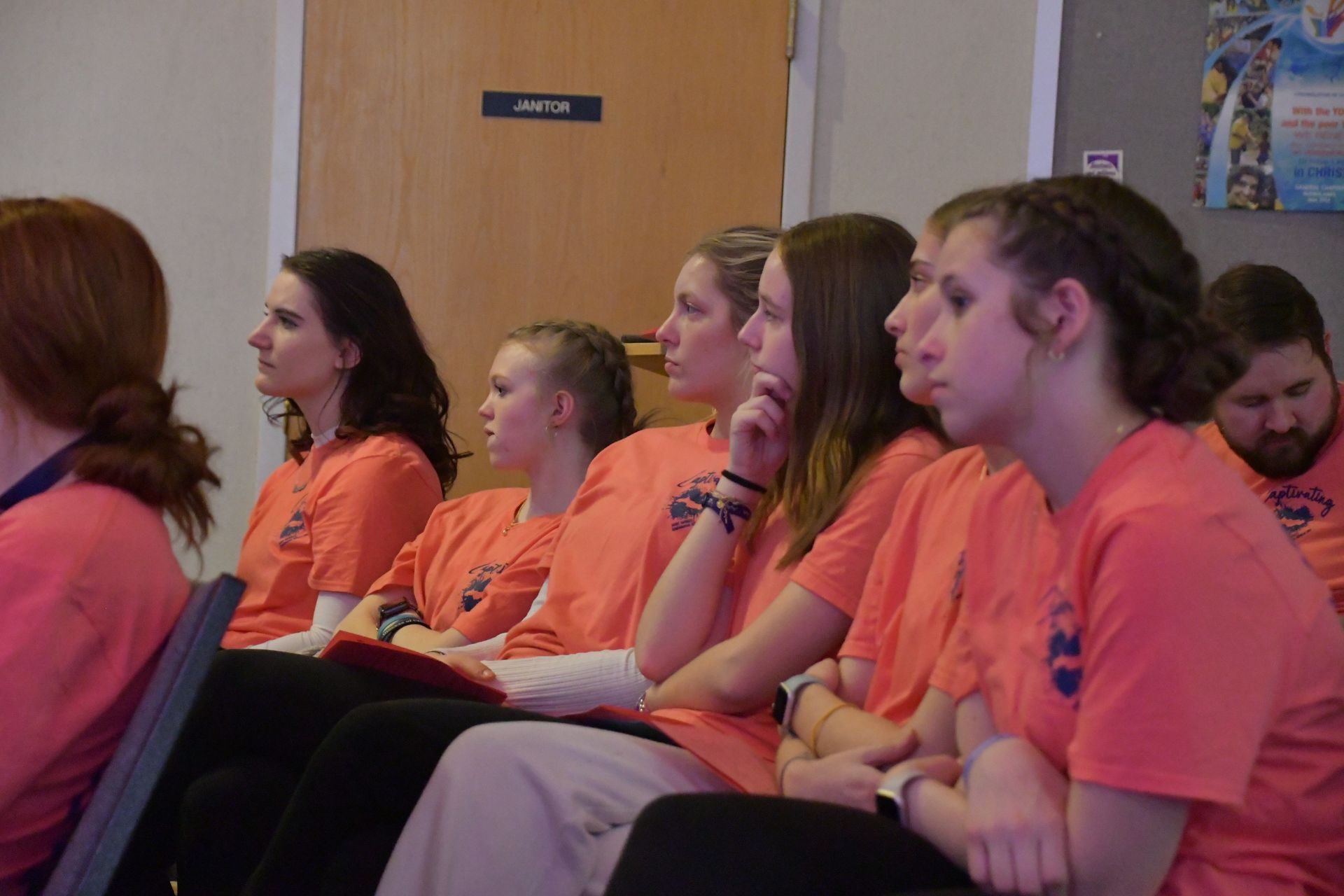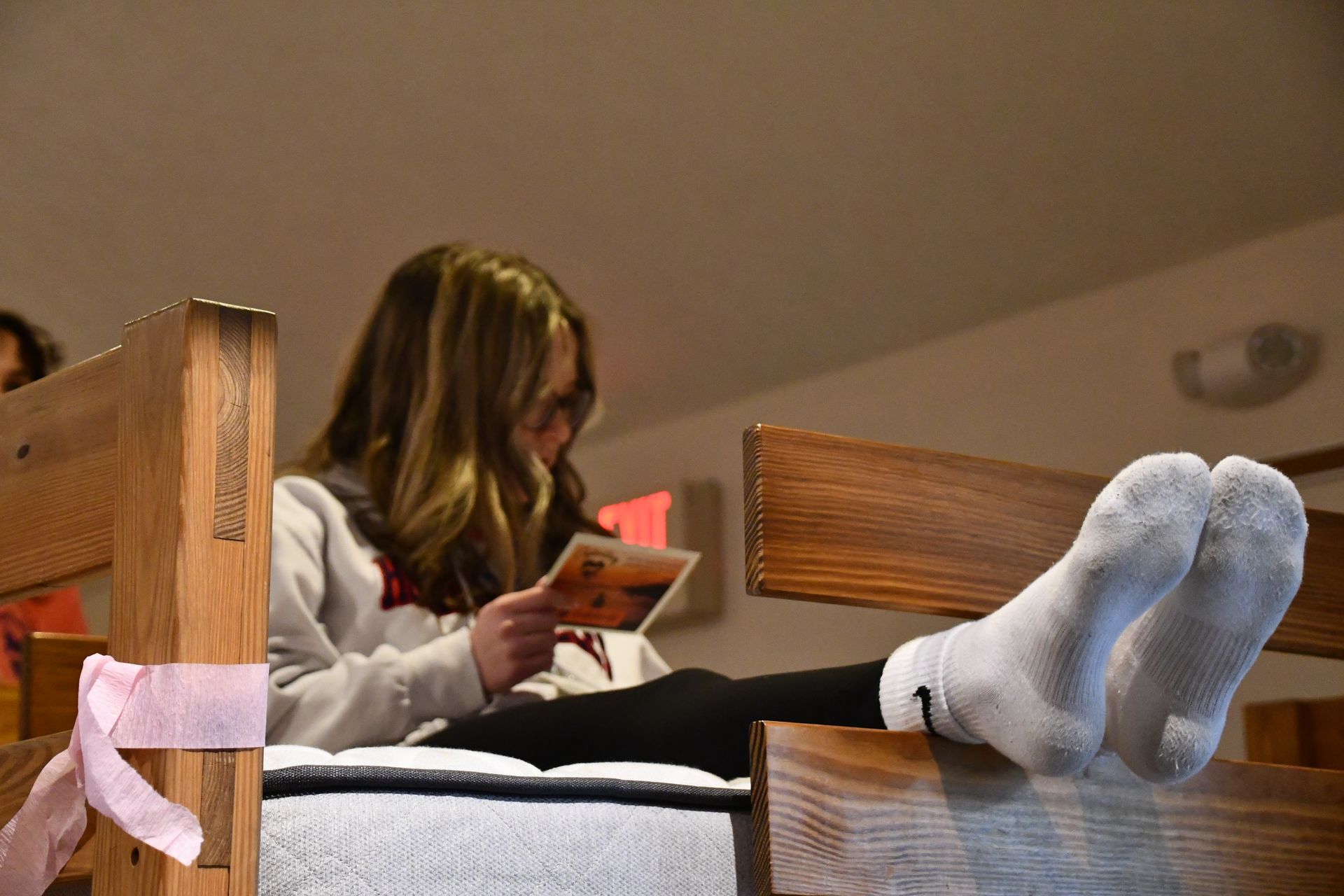IGNITE CONFIRMATION
Sacrament preparation for Grade 8
2025 Retreat Details

Retreat Basics/FAQ
Retreat FAQBoys' Retreat: February 22 - 10am-8pm
Girls' Retreat: February 23 - 10am-8pm
Location: St. Leonard Retreat Center, 4076 Case Road, Avon, OH 44011
A day to delve deeply into the important questions we all face in life: who am I? What is my purpose? Who is God and what does He want to do with me? The day unfolds with personal witnesses from adults and teens, opportunities to share in small groups, prayer times, fun activities, meals, and free time to journal or simply be present in the silence which retreat allows. We will end the day with Mass for the teens at St. Leonard and ask them to affirm their desire to be Confirmed in the Faith and help them to make resolutions to grow as disciples of Jesus.
Parent Letter (Time Sensitive)
Parent Letter (IMPORTANT)Please click the link for an important letter for Parents of Teens attending the retreat!
Retreatant Letter
Retreatant LetterPlease click the link for a letter for Teens attending the retreat!
2025 Basic Details
Calendar 2024/25
August 27, 7-8:15pm: Parent & Rising 8th Graders
September 22, 5-6:30pm: Ignite | Unleash the Gospel
October 27, 5-6:30pm: Ignite | Unleash Holiness
November 24, 5-6:30pm: Ignite | Unleash Mercy (Confirmation Name & Sponsors DUE)
December 15, 5-6:30pm: Ignite | Unleash Love
January 12, 5-6:30pm: Ignite | Unleash You
February 22, ALL DAY: Boys' Retreat at St. Leonard Youth Retreat Center
February 23, ALL DAY: Girls' Retreat at St. Leonard Youth Retreat Center
March 9, 5-6:30pm: Confirmation Rehearsal (Service Hours/Apostolate DUE)
March 16, 3:00pm: Confirmation Mass
Pre-Requisites
- Registration (in August)
- Sacrament Materials Fee ($100)
- Enrollment in a Catholic Grade School or Middle School Ministry
- Baptism Certificate
- Sponsor Certificate (standard form received from Sponsor's parish)
Ignite (5 Sundays)
Ignite—as in “to start a fire” are our monthly gatherings for Confirmation Formation. They take place in four parts, following the pattern of the Mass:
Gather—we come together in the Church as a community on a common journey: to grow as disciples and to prepare for receiving the Sacrament of Confirmation
Proclaim—we share the Greatest Story Ever Told, and not just the amazing things Jesus did 2000 years ago, but everything He has done in the lives of people since, and what he desires to do in our lives
Break—we break into small groups to discuss the proclaim, and to grow together with our peers in that group. Discipleship isn’t about just knowing what the Church teaches, but living a life of faith and holiness in every one of our unique situations. Each group will have the same teens and adult leader all year to foster that growth.
Send—after we gather together again, we pray and are sent forth to go and live our faith in the world. Most months, there will be a challenge to complete before our next meeting (like finding your Confirmation name, for example)
There are 5 Ignites throughout the year, roughly once a month, from 5:00-6:30pm (please arrive early for check-in!)
The topics are meant to draw us deeper into our Christian Faith and our understanding of the Sacrament. They aren’t a comprehensive study of the Church, but launching points for prayer and spiritual growth.
Meeting monthly underscores the reality that formation is a process, a journey—it can’t be completed without a community of support and a willingness to experience. That is also the reason formation differs from PSR or day school Religion Classes. Our aim isn’t to attain mastery of a subject or earn something like a diploma. It is to open our minds and hearts to receive the graces that God desires to pour out upon us, to increase the vocabulary of the Holy Spirit in us, and to mature as disciples.
Retreat
Retreat FAQBoys' Retreat: February 22 - 10am-8pm
Girls' Retreat: February 23 - 10am-8pm
Location: St. Leonard Retreat Center, 4076 Case Road, Avon, OH 44011
A day to delve deeply into the important questions we all face in life: who am I? What is my purpose? Who is God and what does He want to do with me? The day unfolds with personal witnesses from adults and teens, opportunities to share in small groups, prayer times, fun activities, meals, and free time to journal or simply be present in the silence which retreat allows. We will end the day with Mass for the teens at St. Leonard and ask them to affirm their desire to be Confirmed in the Faith and help them to make resolutions to grow as disciples of Jesus.
Choosing a Confirmation Name
- You do not have to take a new name. If you choose, you can be Confirmed by your Baptismal Name.
- If you take a new name, it should be the name of a saint—we are assured of their place in heaven, they are excellent role models for living the Christian life, and they can pray for and with us.
- You are choosing this name to symbolize your life as a Christian, and asking that saint to be your patron. Pick a name based on the merit of the saint, not on how much you like the name.
- Do not be pressured into choosing family names or using your name to honor someone. That is not the purpose of a Confirmation name.
- I will ask for your name at our IgNight in November - you just need to know the name by then!
RESOURCES for names:
While you get to pick a name, you are also discerning the someone you would like to emulate and who will be a friend and intercessor for you in heaven. So first, pray and ask the Holy Spirit to guide you in your search process. Then, when you have done some research, pray to that saint and ask them to pray for you as you approach your Confirmation.
Lifeteen Biggest and Best List of Saints
Popular Saints from Around the World
Choosing a Sponsor
1. A Catholic in Good Standing (as determined by their Pastor)
2. Is at least 16 years old
3. Has received Baptism, Confirmation, and Eucharist
4. If they are married, they are in a valid marriage
5. Not your mother or father
Additionally, they should be…
1. Someone who you look up to as a role model, especially in their practice of the Faith
2. Someone who you can converse with about questions you have with faith or religion
3. Someone who will pray for and with you
Sponsors do not attend meetings. Because of the size of our Confirmation classes, it is unwieldy to have sponsors join in any of our Ignites or Retreat (although we will ask families to write letters to our Confirmandi on their retreat, which is an excellent way for sponsors to get involved). However, we do ask sponsors to attend the rehearsal before the Confirmation Liturgy (see the calendar) in order to experience both the Liturgy and our final review and preparation for the Sacrament.
Although, in some cases, they may be excellent choices, I urge you to think twice before automatically using grandparents or siblings as your sponsor. Both already have a close relationship with you and, in the case of a sibling, may not have enough experience to be the role model you want for Confirmation. Both are okay, but I urge you to think and pray about these people in the role of sponsor.
All I require from your sponsor is a letter or form, from their parish, stating that they are eligible to be a sponsor. This is standard in all Catholic churches. I do not need one if they are a Saint Raphael Parishioner.
Sponsor letters should be given or mailed to me at their earliest convenience.
Service & Opportunities
Service Hours Log SheetService is required as part of Confirmation Formation - either a year-long apostolate (one big project or a program spanning multiple meetings) or 15 service hours. All 15 hours can be done in the community or all 15 can be done at the parish or you can divide these up so hours can be a part of both the community and parish. Paid projects should not count toward your 15 hours.
You may begin tracking your Confirmation Service hours as early as March of your 7th grade year.
These opportunities are available NOW to the 2025 Confirmation Class:
- Littlest Angels Child Care Helper (Sundays during 10 AM Mass) - Details and Sign-up here
- Fish Fry Helpers during Lent - Sign-up
Being A Sponsor
The primary responsibility of the sponsor is to provide the candidate prayerful support and guidance in his or her Christian walk and to “take care that the confirmed person behaves as a true witness of Christ and faithfully fulfills the obligations inherent in this sacrament” (canon 892). Being a sponsor is a lifelong commitment. A sponsor takes on the role of a spiritual parent who “brings the candidate to receive the sacrament, presents him to the minister for the anointing, and will later help him to fulfill his baptismal promises faithfully under the influence of the Holy Spirit” (Rite of Confirmation 5). The role is virtually the same as that of a Baptismal Godparent, and is rooted in early Church Catechists, who were responsible both for the education and formation of those interested in converting and advocates for those candidates to the Christian Community.
Some of the responsibilities of a sponsor to the candidate before confirmation:
Be a convinced, enthusiastic Catholic who lives a life of faith, and is committed to fulfilling the responsibilities of a sponsor.
Pray regularly for and with the candidate, showing him/her how to pray by example.
Cultivate a supportive and encouraging relationship with the confirmand.
Be involved in the catechetical preparation of the candidate with great heart and dedication.
Have knowledge of the personal faith of the candidate and share your own faith experience.
Lead and guide the candidate to a personal relationship with the Lord and to a deeper familiarity “with the Holy Spirit—his actions, his gifts, and his biddings—in order to be more capable of assuming the apostolic responsibilities of Christian life” (CCC 1309).
Some of the responsibilities of a sponsor to the confirmed after confirmation:
Maintain regular contact with the confirmed by phone, email. Also, sending a card on the anniversary of his/her confirmation.
Pray regularly for the confirmed and when possible pray with him/her.
Help the confirmed to learn how to experience a deeper prayer life (e.g. eucharistic adoration).
Encourage participation in the life of the Church, especially through his/her parish.
Continue ongoing catechesis (e.g., sharing good books) and be available for questions.
Help the confirmed to understand how to bear witness to Christ in the world and to fulfill his/her baptismal promises faithfully through the Holy Spirit.
What is required to be a sponsor?
1. A Catholic in Good Standing (as determined by their Pastor)
2. Is at least 16 years old
3. Has received Baptism, Confirmation, and Eucharist
4. If they are married, they are in a valid marriage
5. Not your mother or father
Additionally, they should be…
1. Someone who you look up to as a role model, especially in their practice of the Faith
2. Someone who you can converse with about questions you have with faith or religion
3. Someone who will pray for and with you
Although, in some cases, they may be excellent choices, I urge you to think twice before automatically using grandparents or siblings as your sponsor. Both already have a close relationship with you and, in the case of a sibling, may not have enough experience to be the role model you want for Confirmation. Both are okay, but I urge you to think and pray about these people in the role of sponsor.
All I require from your sponsor is a letter or form, from their parish, stating that they are eligible to be a sponsor. This is standard in all Catholic churches. I do not need one if they are a Saint Raphael Parishioner.
Do sponsors have to attend any meetings?
In general, No. Because of the size of our Confirmation classes, it is unwieldy to have sponsors join in any of our IgNights or Retreat (although we will ask families to write letters to our Confirmandi on their retreat, which is an excellent way for sponsors to get involved). However, we do ask sponsors to attend the rehearsal before the Confirmation Liturgy (see the calendar) in order to experience both the Liturgy and our final review and preparation for the Sacrament.
Discover more
What is Confirmation
What Catholic Teens Need to Know About Confirmation
BY CATECHIST'S AIDE ON SEPTEMBER 6, 2018
A good way to begin any Confirmation preparation is with a basic understanding of what the sacrament is all about. Only then can our young Catholics understand why Confirmation is so essential. The first step in the process is easy enough – ask the students, “What does it mean to be confirmed?” Don’t be alarmed if the only response you get is a shrug of the shoulders or a blank stare. You may have a few students who will respond with “becoming an adult in the Church” or “confirming what our parents chose for us at our Baptism.” Whatever the response, it’s our job as Catechists to help set the record straight about exactly what Confirmation is, and perhaps more importantly, what it is not.
Let’s start by dispelling one of the more common myths about Confirmation:
IT’S NOT A CHOICE
This is a little misleading. Clearly, one can choose to receive Confirmation, or not. However, the sacrament is not an opportunity where the Confirmandi “choose” for themselves to be Catholic, or “confirm” the choice made for them by their parents and godparents at Baptism. Regardless of whether we had any voice in the matter, Baptism marks us with an indelible (permanent) mark as Catholic Christians. We become full members of Christ’s body, the Church through Baptism.
From the Catechism of the Catholic Church (CCC):
“Incorporated into Christ by Baptism, the person baptized is configured to Christ. Baptism seals the Christian with the indelible spiritual mark (character) of his belonging to Christ. No sin can erase this mark, even if sin prevents Baptism from bearing the fruits of salvation. Given once for all, Baptism cannot be repeated.” (CCC 1272)
The Catechism also reminds us that “baptismal grace is a grace of free, unmerited election and does not need ‘ratification’ to become effective.” (CCC 1308)
So, understanding that we are already fully Catholic through Baptism makes the question, “what does it mean to be confirmed,” all the more critical. To answer this, we must look at what Confirmation is, and what it does for us.
CONFIRMATION IMPARTS GRACE
Like all the sacraments, Confirmation is a gift given by God. And, like all of God’s gifts, it is designed to help us grow in holiness, and bring us into closer relation with Him through the imparting of grace.
IT COMPLETES THE CHRISTIAN INITIATION BEGUN AT BAPTISM
Wait a minute! We just said that Baptism makes us full members of the Church. What is left to complete?
“Baptism, the Eucharist, and the sacrament of Confirmation together constitute the ‘sacraments of Christian Initiation,’ whose unity must be safeguarded. It must be explained to the faithful that the reception of the sacrament of Confirmation is necessary for the completion of baptismal grace. For ‘by the sacrament of Confirmation, [the baptized] are more perfectly bound to the Church and are enriched with a special strength of the Holy Spirit. Hence they are, as true witnesses of Christ, more strictly obliged to spread and defend the faith by word and deed.’” (CCC 1285)
Consider that, for the most part, Catholics are baptized as infants. “The faith required for Baptism is not a perfect and mature faith, but a beginning that is called to develop.” (CCC 1253) Our faith at baptism requires nourishment to grow and mature. We receive this nourishment through the Eucharist and catechesis. All members of the Church share in the responsibility of faith formation and religious education: parents, godparents, the clergy and the parish community. This maturing of the faith prepares us for Confirmation, where we are strengthened by the Holy Spirit to go out into the world as faithful witnesses and disciples of Christ. As members of Christ’s Body (the Church), we share an “apostolic calling” to spread God’s kingdom throughout the world. Jesus told his disciples, “Just so, your light must shine before others, that they may see your good deeds and glorify your heavenly Father.” (Matthew 5:16) We are also called to be a light unto the world, and the sacrament of Confirmation equips us for that mission.
IT IS THE FULL OUTPOURING OF THE HOLY SPIRIT
In John’s Gospel, we read that Christ prepared his followers for his eventual departure from this earth. He told them that it would be better for them if he left because then he would send the Advocate to be with them. At the time, the apostles were full of grief at the thought of Jesus going and probably didn’t understand who this mysterious Advocate was. But, just as Jesus promised, at Pentecost, the apostles received the outpouring of the Holy Spirit. They were able to recognize that this was the person Jesus sent to lead them to the truth, to guide them, and to strengthen them. And, because they were receptive, the Holy Spirit was able to work within them to transform them from frightened men, in hiding from the authorities to proclaimers of the resurrection! The Holy Spirit which the apostles received is the same Holy Spirit whose gifts are sealed within us at Confirmation. He seeks to work within us in the same way. If we are receptive and open to his gifts, we too can be transformed, confident that we can accomplish every good thing.
When we reduce Confirmation to a giant to-do list that we race to complete, we risk losing the importance of what is happening along the way. Confirmation is so much more than just another box to check on the way to adulthood. Talk to your students and children about what this sacrament really means. Don’t let them miss out on experiencing one of God’s greatest gifts.
© 2018 Catechist’s Aide
Big Picture Theological Questions
What is Confirmation?
Confirmation is the third sacrament of Christian Initiation (the other being Baptism and Eucharist), in which the baptized “are more perfectly bound to the Church and are enriched with a special strength of the Holy Spirit. Hence they are, as true witnesses of Christ, more strictly obliged to spread and defend the faith by word and deed” (Catechism of the Catholic Church #1285).
Is Confirmation Catholic graduation?
One of the most commonly misunderstood teachings regarding Confirmation is that it is the Catholic equivalent of graduation, or it is some strange coming of age ceremony. Those ideas entered the arena as Baptism and Confirmation became more separated temporally, the Eucharist took place before the reception of Confirmation, and many have been Confirmed in these United States around the age of so-called maturity when they were entering or newly in high school. This is a blatant fallacy and should be avoided at all costs. Confirmation does not end anything, it is a beginning and a jumping off point for the Christian life. In it, the gifts of Baptism are strengthened and sent out to be used. Likewise, even if the recipients of this sacrament happen to be adolescents, it should not be treated as a coming of age ceremony. The renewal of Baptismal promises is a continuation of that sacrament and a sealing of it, not a commemoration or a “taking ownership for one’s own faith.” That can and should take place at all times, not in the context of another sacrament with its own character and effects.
Who does the Sacrament of Confirmation?
If you said the bishop, you are correct, but only to an extent (He is the minister of the Sacrament, the one who mediated it). Like all of the sacraments, it is God who initiates them. The Catechism paragraph 1210 says that “Christ instituted the sacraments of the new law.” That is to say, our role in the sacraments is not to initiate them or to do them, but to receive them. Our attitude must be one of receptivity. That is my goal throughout this catechesis and the formation program – not to give the tools necessary to do a sacrament like it were a task to be completed or a final exam to be taken, but to help give you topics and information for reflection that might open your minds and heart to receiving this sacrament and allowing all of the effects to work in you.
Who is the Holy Spirit?
“The Advocate, the Holy Spirit that the Father will send in my name—he will teach you everything and remind you of all that I told you.” –John 14:26
This is often our first thought of where the Holy Spirit comes from – he is an advocate given to us by Jesus when Jesus was preparing to die. However, the Holy Spirit has much more presence in the scripture than we normally give Him credit for. Isaiah 11:1-3 says But a shoot shall sprout from the stump of Jesse, and from his roots a bud shall blossom. The spirit of the Lord shall rest upon him: a spirit of wisdom and of understanding, A spirit of counsel and of strength, a spirit of knowledge and of fear of the Lord, and his delight shall be the fear of the Lord. “The prophets announced that the Spirit of the Lord would rest on the hoped-for Messiah for His saving mission” –CCC 1286. Locating the Holy Spirit in the Old Testament gives us some foundation for His action in the world today.
The Holy Spirit came to rest upon Jesus at His baptism by John After Jesus was baptized, he came up from the water and behold, the heavens were opened, and he saw the Spirit of God descending like a dove coming upon him. And a voice came from the heavens, saying, “This is my beloved Son, with whom I am well pleased.”-Matthew 3:16-17. This appearance of the Holy Spirit signifies two things to us. First, Jesus fulfils what was foretold about the messiah from the Old Testament prophets. The Spirit of the Lord in fact rested upon Him, as shown here in His baptism. Second, this scene gives us a very Trinitarian moment to reflect upon.
I have been fairly cavalier about calling the Holy Spirit by personal pronouns, and that is not a mistake. The Holy Spirit is part of the Trinity, three persons in one God – three whos in one what. That topic alone could take us an entire class to discuss, but the important point is that the Holy Spirit is not a dove or a tongue of flame – even if those are the symbols we often use to depict Him. The Holy Spirit is not an it, He is a who. Thus, in this moment of Jesus’ baptism, we are shown the person of Jesus –God the Son - in the water being baptized, the person of God the Father speaking in a voice from heaven, and the person of the Holy Spirit descending upon Jesus. This is important. When we receive the Holy Spirit, we are given a person as our advocate, not just an impersonal power or impersonal gifts. We will spend more time with that later.
Jesus did not keep the Spirit to himself throughout his ministry, but promised several times the outpouring of that spirit. Luke 12:12, John 7:37-39, and Acts 1:8 all contain examples, but I like this formulation from John 3:5-8 Jesus answered, “Amen, amen, I say to you, no one can enter the kingdom of God without being born of water and Spirit. What is born of flesh is flesh and what is born of spirit is spirit. Do not be amazed that I told you, ‘You must be born from above.’ The wind blows where it wills, and you can hear the sound it makes, but you do not know where it comes from or where it goes; so it is with everyone who is born of the Spirit.” Here Jesus is teaching Nicodemus the path to discipleship and salvation, and promises the outpouring of the spirit as that path.
The Holy Spirit is one of the three persons of the trinity, active from the beginning of time, working throughout the scriptures, and definitively shown as coming to rest on the person of Christ Jesus, who in turn gave us the Holy Spirit to be our advocate to God the Father. That’s a pretty good back story for someone we normally minimize to being a flaming fowl.
Why are there three Sacraments of Initiation?
First, the sacraments in their entirety – all seven – “touch all the stages and all the important moments of human life: they give birth and increase, healing and mission to the Christian’s life of faith” (CCC 1211). In particular, “The sacraments of Christian initiation - Baptism, Confirmation, and the Eucharist - lay the foundations of every Christian life” (CCC 1212). These three sacraments build on each other. The Catechism paragraph 1275 succinctly states that “Christian initiation is accomplished by three sacraments together: Baptism which is the beginning of new life; Confirmation which is its strengthening; and the Eucharist which nourishes the disciple with Christ's Body and Blood for his transformation in Christ.”
It is helpful here to consult St. Paul’s great image of the Church: As a body is one though it has many parts, and all the parts of the body, though many, are one body, so also Christ. For in one Spirit we were all baptized into one body, whether Jews or Greeks, slaves or free persons, and we were all given to drink of one Spirit (1 Corinthians 12:12). Using this as out model, it is easier to evaluate these three sacraments together. In Baptism, we die to our sins and rise to new life in Christ, which is to say we become members of the Body of Christ. This means true members, mind you, like cells or sinews or sinuses; it does not mean a member as of a guild or a country club. This is an important distinction. In Confirmation, we are strengthened as members of the Body. This is a metaphorical spiritual workout. No longer are we passive parts, but we are called to be active, and are given gifts to help us proclaim and defend the faith. Finally, in receiving the Eucharist, we are nourished with the Body and Blood of Christ to be conformed more and more to Christ himself. This is the brilliance of St. Paul’s image – it isn’t merely an image, but a symbol of what we as the Church truly are.
To say a bit more, Baptism is the foundational sacrament by which we are made members of the Church. By Baptism, we die with Christ to our sin and rise to new life with Him. This isn’t a ritual cleansing; it is a spiritual death and a completely new type of life given by Him. Here it is that we can understand Paul’ statement It is no longer I who live, but Christ who lives in me (Galatians 2:20). So radical is what happens in the font at Baptism that we have a whole new way of existing in the world as Christians, as followers of Christ and as anointed individuals called to share in Christ’s mission. Confirmation strengthens this call and, by the outpouring of the Holy Spirit, gives us gifts to better live our lives as Christians. We will discuss this more in the next section.
There are three sacraments of Initiation because Christ gave them to us for our benefit – to take away our sin and make us members of His body, the Church, to strengthen us in our Baptismal call to preach, teach, and defend the faith, and to continually give us Himself as strength for the journey in order to live out our lives as Christians.
What are the effects of the Sacrament of Confirmation?
“It is evident from its celebration that the effect of the sacrament of Confirmation is the special outpouring of the Holy Spirit as once granted to the apostles on the day of Pentecost” (CCC 1302). This reality is seen concretely in the following ways:
- it roots us more deeply in the divine filiation which makes us cry, "Abba! Father!" For you did not receive a spirit of slavery to fall back into fear, but you received a spirit of adoption, through which we cry, “Abba, Father!” (Romans 8:15) “Divine filiation” is the technical term which means we are made sons and daughters of God.
- it unites us more firmly to Christ;
- it increases the gifts of the Holy Spirit in us;
- it renders our bond with the Church more perfect;
- it gives us a special strength of the Holy Spirit to spread and defend the faith by word and action as true witnesses of Christ, to confess the name of Christ boldly, and never to be ashamed of the Cross
These are all an elaboration on this short-hand reality: in Confirmation, you are gifted with the Holy Spirit in a concrete way, marked by that reality, and strengthened in your Baptism to be more united to the Church and to share and defend the faith.
How do we celebrate the Sacrament of Confirmation?
The Sacraments of Confirmation and Baptism are inextricably linked, so much so that St. Cyprian called the two a “double sacrament” and that our eastern brothers and sisters still celebrate the two immediately back-to-back as part of the same service. We in the west have occasionally moved to what we call the “restored order” of the sacraments, which can be expeditiously seen on Holy Saturday night when you witness catechumens welcomed into the Church by receiving all three sacraments during the same mass. The reason for this linkage should be evident from our treatment of section two, above. However, it is worth noting something from the rite of Confirmation and of Baptism. Both have in the rite anointing, which links them closely together.
It became the tradition in the west to postpone Confirmation as parishes grew more numerous and Christianity spread, reserving that sacrament to bishops even as priests took over the everyday running of parishes and were granted faculties to preside over some of the sacraments of the Church (for more info on this, see CCC 1290-1292). This practice continues even today, as it preserves the unity of the local Church with the bishop and by extension “the unity, catholicity, and apostolicity of the Church” (CCC 1292). The connection with Baptism is still explicitly stated in the Rite of Confirmation, as all those to be Confirmed first renew their baptismal promises.
The form and matter of the Confirmation, that is, the essential elements that make the sacrament, the words and the material, come straight from scriptural bases. First, the matter of Confirmation is the laying on of hands and anointing with oil – Chrism. This comes from the New Testament Acts of the Apostles, for example Now when the apostles in Jerusalem heard that Samaria had accepted the word of God, they sent them Peter and John, who went down and prayed for them, that they might receive the holy Spirit, for it had not yet fallen upon any of them; they had only been baptized in the name of the Lord Jesus. Then they laid hands on them and they received the holy Spirit (Acts 8:14-17). And also from the Old Testament, where three kinds of people were anointed: priests, prophets, and kings. A good example is of David He was ruddy, a youth with beautiful eyes, and good looking. The Lord said: There—anoint him, for this is the one! Then Samuel, with the horn of oil in hand, anointed him in the midst of his brothers, and from that day on, the spirit of the Lord rushed upon David (1 Samuel 16:12-13). Both anointing with oil and the laying on of hands were acts which symbolized – and indeed manifested – the Holy Spirit.
The form of Confirmation, that is the words that manifest what they say, is “Accipe signaculum doni Spiritus Sancti,” “Be Sealed with the Gift of the Holy Spirit” (CCC 1300). St. Paul says to the Ephesians In him you also, who have heard the word of truth, the gospel of your salvation, and have believed in him, were sealed with the promised holy Spirit, which is the first installment of our inheritance toward redemption as God’s possession, to the praise of his glory (Ephesians 1:13-14). These two together, the laying on of hands, the anointing with Chrism, and the pronouncing “Be sealed with the Gift of the Holy Spirit” make up the essential rite of Confirmation.
Practical Questions (The Mass & Rehearsal)
What time is Rehearsal? How long will it be?
Rehearsal is on Sunday, March 9th from 5-6:30pm, the same time frame as Ignites. We will be in the Church most of the evening. In many ways, it will be our sixth Ignite | Confirmation! That is because we will accomplish three things: to teach how to get from point A to point B in the Confirmation liturgy, to show you WHY we go from point A to point B during the liturgy, and to help you pray well when going between point A and point B during the liturgy. This three-fold approach will underscore what we strive for all year, to not just teach you the faith, but to give you good reasons why it makes sense and why it matters, and help you to encounter Jesus Christ in it.
Do Sponsors have to come to rehearsal? What if my sponsor cannot attend rehearsal?
Sponsors are requested to come to the rehearsal, yes. If they are not available, a parent or other responsible party can sit in for them. If no one is available, that is okay (we try to spell out for sponsors exactly what they need to do on the day of Confirmation, too), but we've found that having another set of ears and eyes present is pretty helpful.
What if the Sponsor can’t be present at Confirmation?
If the sponsor cannot be present at the confirmation than he/she is to appoint a proxy to take their place. This person should also follow the requirements of a sponsor, but if need be, a parent or sibling could stand in as proxy. Please let us know as early as possible. The original sponsors name is the one recorded in the Sacramental Register.
What are we expected to wear for Confirmation day?
The only dress code for Confirmation is that it be modest and appropriate. That usually means collared shirts and slacks on the gentlemen (coats and ties are appropriate), and dresses, skirts, or dress pants and blouses for the ladies. The female adult leaders have suggested a "bow/genuflect test" for skirts and dresses - be mindful that as the Confirmandi enter the Church, they will make a profound bow to the altar. Clothing should be long enough to cover even when bowing. There are no color requirements, but red or white are appropriate if you are looking for suggestions.
Will there be assigned seats at Confirmation?
Yes, but for Confirmandi and sponsors only. Family can be seated anywhere else in the Church on a first come, first served basis. Please be mindful that many will want to attend this Mass.
What time does my child need to arrive on Confirmation day?
The Confirmandi should arrive no later than 2:00p.
What time does the Sponsor need to arrive on Confirmation day?
The Sponsor should arrive no later than 2:00p and be in the assigned seat before 2:15pm.
How many guests can I invite to the Confirmation Mass?
There is no limit to Mass attendance. We will have additional seating available in the Gathering Area for overflow, if needed, and it can also be used by those who wish a little more distance from others. We will also have the Mass live streamed as noted for those who wish to watch from home.
Will the Confirmation Mass be on livestream?
Yes! You will find it at saintraphaelparish.com/confirmation/livestream. There is a password: TBD.
When should we expect Mass to end?
The Confirmation Mass will likely take 2 hours, so you can expect Mass to end closer to 5:00p.
Can I take pictures during Mass?
No, at the request of the Diocese and out of reverence for the liturgy, pictures are not permitted during Mass. However, the Bishop, as well as our priests, will be available after Mass to take pictures with the newly Confirmed. Thank you for following this guideline.
Therefore, brothers, be all the more eager to make your call and election firm, for, in doing so, you will never stumble. (2 Peter 1:10)

